Contents
Page list

of related interest
Autism and Masking
How and Why People Do It, and the Impact It Can Have
Dr Felicity Sedgewick, Dr Laura Hull & Helen Ellis
ISBN 978 1 78775 579 6
eISBN 978 1 78775 580 2
Camouflage
The Hidden Lives of Autistic Women
Dr Sarah Bargiela
Illustrated by Sophie Standing
ISBN 978 1 78592 566 5
eISBN 978 1 78592 667 9
Pretending to be Normal
Living with Aspergers Syndrome (Autism Spectrum Disorder) Expanded Edition
Liane Holliday Willey
ISBN 978 1 84905 755 4
eISBN 978 0 85700 987 6
TAKING OFF THE MASK
Practical Exercises to Help Understand and
Minimise the Effects of Autistic Camouflaging
Dr Hannah Louise Belcher
Foreword by Will Mandy, PhD, DClinPsy

First published in Great Britain in 2022 by Jessica Kingsley Publishers
An imprint of Hodder & Stoughton Ltd
An Hachette Company
Copyright Dr Hannah Louise Belcher 2022
Foreword copyright Will Mandy, PhD, DClinPsy 2022
The right of Dr Hannah Louise Belcher to be identified as the Author of the Work has been asserted by her in accordance with the Copyright, Designs and Patents Act 1988.
The Camouflaging Autistic Traits Questionnaire (CAT-Q) on pages 66 -7 0 is reproduced from Hull 2019 with kind permission from the authors.
Front cover image source: Shutterstock. The cover image is for illustrative purposes only, and any person featuring is a model.
All rights reserved. No part of this publication may be reproduced, stored in a retrieval system, or transmitted, in any form or by any means without the prior written permission of the publisher, nor be otherwise circulated in any form of binding or cover other than that in which it is published and without a similar condition being imposed on the subsequent purchaser.
All pages marked with  can be downloaded at https://library.jkp.com/redeem for personal use with this programme, but may not be reproduced for any other purposes without the permission of the publisher.
can be downloaded at https://library.jkp.com/redeem for personal use with this programme, but may not be reproduced for any other purposes without the permission of the publisher.
A CIP catalogue record for this title is available from the British Library and the Library of Congress
ISBN 978 1 78775 589 5
eISBN 978 1 78775 590 1
Jessica Kingsley Publishers policy is to use papers that are natural, renewable and recyclable products and made from wood grown in sustainable forests. The logging and manufacturing processes are expected to conform to the environmental regulations of the country of origin.
Jessica Kingsley Publishers
Carmelite House
50 Victoria Embankment
London EC4Y 0DZ
www.jkp.com
This book is dedicated to all the autistic people I have met
who taught me who I was and accepted me for who I am.
Contents
Autistic people generally find themselves living in situations that were designed by and for non-autistic people and, as such, they are commonly expected to live in ways that just do not fit with their needs and natural inclinations. Furthermore, people are often very unforgiving of those who do not conform to their social norms, and autistic people suffer from this all the time, as shown by the high rates of bullying that they continue to face. As Dr Hannah Louise Belcher explains, many autistic people seek to deal with this predicament using a collection of strategies that have come to be known as camouflaging, masking and adaptive morphing, among other terms. This means they seek to hide their autistic traits in order to fit in, sometimes developing elaborate, energy-consuming repertoires of behaviour so they can pass in their interactions with non-autistic people. As Dr Belcher explains, this autistic masking is a natural human response to the challenges of being autistic in a majority-non-autistic world, and can be useful in some situations, for example, during a job interview. But she also makes it very clear, both through relating her own experiences and by drawing on the latest scientific research, that masking is commonly harmful to autistic people, leaving many feeling exhausted, anxious, and unsure of their true wants and needs, let alone how to get these met.
One of the things I find so valuable about this book is that (almost uniquely among autism researchers) Dr Belcher actually has some practical, valid advice about how to address the situation. She acknowledges that masking is best understood as something that is imposed on autistic people by unaccommodating environments we must not make the mistake of placing all responsibility for reducing masking on autistic individuals. Instead, we should ask how environments, such as schools and workplaces, can be made more inclusive so that they no longer impose the obligation to mask. Nevertheless, Dr Belcher is able to offer practical advice to autistic people on how they can reflect on their masking, and then use this as a starting point for gradually reducing it. In this process, there is potential for self-discovery and the prospect of a life that feels more authentic and satisfying.
Is there anyone better qualified to write this book on taking off the mask? I dont think so. Dr Belcher is an academic psychologist who brilliantly articulates her own experiences of masking as an autistic girl and then woman, and of the subsequent journey she has been on creating a different way to be in the world. In this engaging and practical book, she draws upon her own life, her conversations with other autistic people, and disciplines including cognitive behavioural therapy, evolutionary psychology, cognitive neuroscience, and mindfulness. Her tone is compassionate, and she communicates clearly. The book is full of concrete advice and clear steps that can be taken and provides a range of worksheets to help people along.
This is an invaluable resource, providing authentic and wise advice on a topic for which, up to now, there has been little guidance. It is aimed at autistic readers but will be an essential resource for any professional working with autistic people. It tells the story of how Dr Belchers determination, compassion and creativity have enabled her to discover her true self again, and will surely help guide many others on their own journeys in this direction.
Will Mandy, PhD, DClinPsy; Professor of
Neurodevelopmental Conditions, UCL, 2022
This book was inspired by conversations with Professor Will Mandy at University College London, who had recently written a paper entitled Social camouflaging in autism: is it time to lose the mask? (Mandy 2019). I was also heavily influenced by other researchers who had found a link between camouflaging and poorer mental health in autistic people, such as Dr Sarah Cassidy and Dr Laura Hull. They helped me to better understand the need to provide mental health support for autistic people and informed my own research and PhD on the topic.
The ideas I had were shaped too by the other autistic people I spoke to or read about: those who had written and published their own experiences, those who contributed their valuable lived experiences to the pages of this book, and those who provided a listening ear while I was writing.
None of the practical and therapeutic ideas I have shared in this book would have been possible without some of the brilliant psychotherapists I have worked with over the years, especially my former art therapist, Diana Watts, who first recognised that I was autistic and opened up this world to me. I was also helped by the Adult Autism Psychological Therapies Service at the Maudsley Hospital, where I first learned techniques to reduce my camouflaging. I had the privilege of consulting with several psychotherapists while writing this book whom I wish to thank too, in particular clinical psychologist Dr Katherina Hamm.

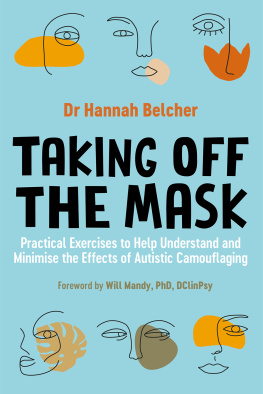

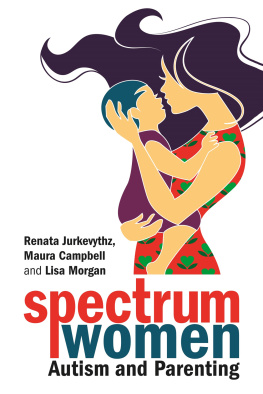
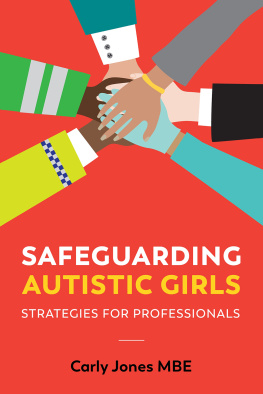
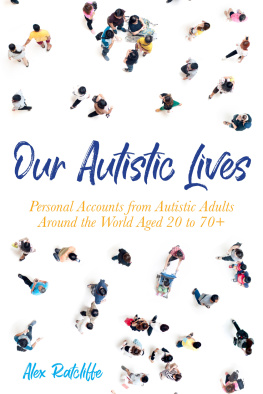
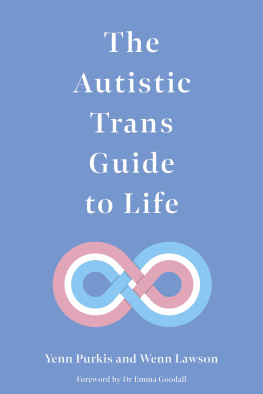
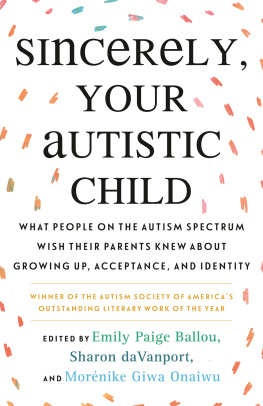
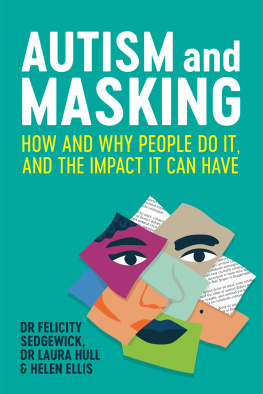
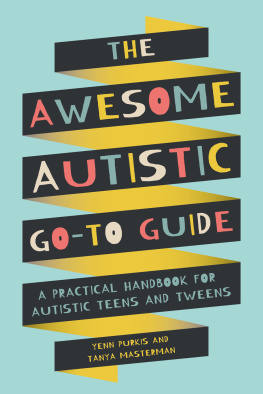
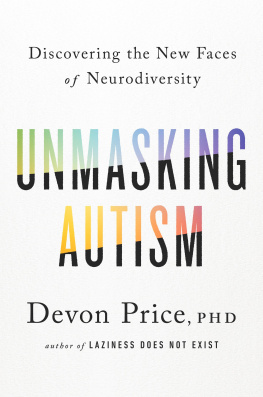

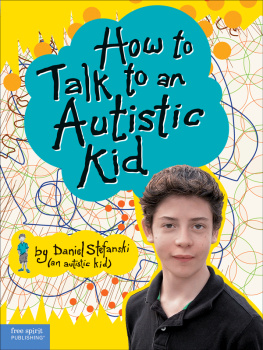
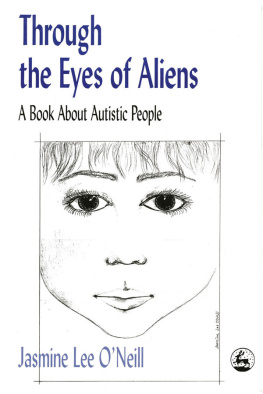


 can be downloaded at https://library.jkp.com/redeem for personal use with this programme, but may not be reproduced for any other purposes without the permission of the publisher.
can be downloaded at https://library.jkp.com/redeem for personal use with this programme, but may not be reproduced for any other purposes without the permission of the publisher.